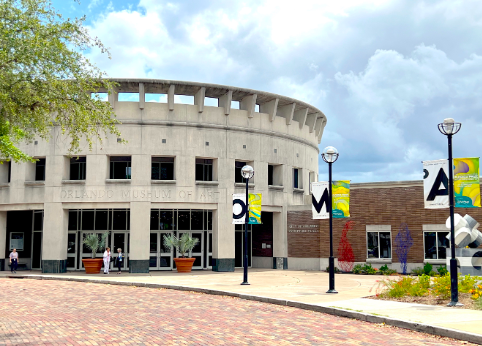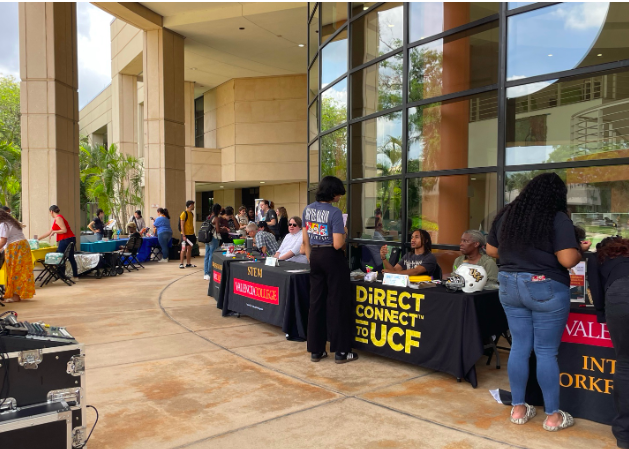Seibles, a former fellow for the National Endowment for the Arts and writing fellow for the Provincetown Fine Arts Work Center in Massachusetts, is an associate professor at Old Dominion University in Norfolk, Va., as well as the author of seven poetry collections, including “Hurdy Gurdy” and “Body Moves.” He is also a recipient of the Open Voice Award from the 63rd Street Y in New York City.
“One of the things I love about poetry is that it’s certainly at moments emotionally electrifying,” he said to gathered guests, “but also in many cases it can be a brain-bender.”
Dean of Winter Park Campus Michele McArdle and creative writing professor Ilyse Kusnetz introduced Seibles to a room of students and faculty who’d been presented with free copies of “Fast Animal” and “Hammerlock.”
“I can tell you, having known Tim now for a few years, these words don’t do him justice,” said Kusnetz after listing off Seibles’s lengthy academic and professional credentials. “He really is an amazing person.”
“For my money, he is one of the best poets writing in America today,” Kusnetz said.
After starting with a select passage by Li-Young Lee, Seibles read nine poems; the first three from “Hammerlock” and the final six from “Fast Animal.” The room held an underwater silence, save for Seibles’s narrative and the occasional outburst of laughter.
The subject matter of the poems ranged from the Roadrunner-Coyote cartoon rivalry to seagulls representing the “bird mafia.” Others involved interracial love (before it was accepted), peculiarities in language, and blues musician James “Blood” Ulmer.
Before every selection, Seibles gave a brief commentary on the context of each. In “Blade, the Daywalker,” he paralleled the comic book vampire-slayer’s struggle against bloodsuckers with his frustration in the years of the Bush presidency.
“During the Bush administration I really felt besieged by a kind of despair as though the culture were invaded in a way I couldn’t have anticipated,” he said. “It was a kind of stupidity, but also a small-hearted mean-spiritedness, and that for me was a kind of seed of vampirism.”
“Blade is the blackest aspect of my own sensibility, enacted through a character. And the Bush administration certainly was wildly problematic, but politics in general often reveal such ugly aspects and such hypocrisy that you could apply the Blade poem to almost any corrupt government,” he said.
Some of the other selections delved into heavy topics like the 1955 lynching of Emmett Till, or disturbing conflicts in parts of the world like Syria or Afghanistan. “I am not walking around with my chin resting on my chest all of the time about how terrible the world is,” Seibles explained. “But I do think that as a writer and a person you have to own up to the fact that there are things that we really need to pay attention to.”
Much of the poetry was presented from a deep personal perspective with twists of humor and sadness. Seibles admitted that poetry could sometimes be overwhelming.
“Yes, it’s true, poetry drives you quietly mad,” he joked after one reading. “I’m not here to pretend otherwise. Your mind just takes that turn.”
“He has absolutely been one of my favorite poets since my undergraduate years in 1993,” said Areej Zufari, a Humanities professor at Valencia East Campus. “For a poet of his caliber – whose poems I now teach as a professor at Valencia – to be speaking here and reading for us and honoring us; it just a blows my mind. It’s definitely an honor and a treat.”
According to Kusnetz, the copies of “Fast Animal” were provided by publisher Etruscan Press a full week ahead of scheduled release. Seibles signed around a dozen of both books after concluding the reading and answering audience questions, engaging students with jovial conversation while jotting notes and signatures inside front covers.
Seibles was chosen by the Florida Writer’s Circuit to be one of four authors this year to visit colleges like Valencia. Student Development funds the Valencia College membership in the Florida Literary Arts Coalition, which makes these visits possible. The next visitor to the Winter Park Campus will be poet and memoirist Paul Guest on February 24.






